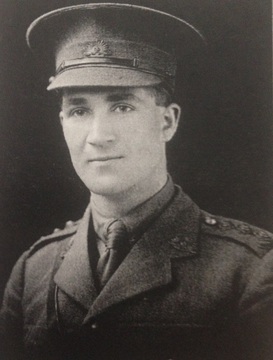UREN, Cecil
| Service Number: | Officer |
|---|---|
| Enlisted: | 1 May 1917, Sydney, New South Wales |
| Last Rank: | Captain |
| Last Unit: | Medical Officers |
| Born: | Aberdeen, New South Wales, 29 December 1892 |
| Home Town: | Sydney, City of Sydney, New South Wales |
| Schooling: | Maitland High School, Sydney High School & Sydney University |
| Occupation: | Surgeon |
| Died: | Tuberculosis, Orange, New South Wales, 11 April 1934, aged 41 years |
| Cemetery: |
Lower Portland General Cemetery, NSW Methodist Section |
| Memorials: |
World War 1 Service
| 1 May 1917: | Enlisted AIF WW1, Sydney, New South Wales | |
|---|---|---|
| 14 Jun 1917: |
Involvement
AIF WW1, Captain, Officer, Medical Officers, Enlistment/Embarkation WW1, --- :embarkation_roll: roll_number: '23' embarkation_place: Sydney embarkation_ship: HMAT Hororata embarkation_ship_number: A20 public_note: '' |
|
| 14 Jun 1917: | Embarked AIF WW1, Captain, Officer, Medical Officers, HMAT Hororata, Sydney | |
| 26 Aug 1920: | Discharged AIF WW1 |
Help us honour Cecil Uren's service by contributing information, stories, and images so that they can be preserved for future generations.
Add my storyBiography
"Cecil Uren was born in Aberdeen, NSW, son of Alfred Uren, headmaster of Croydon Park Public School, and his wife Alberta Louisa Smith. Cecil was educated at Maitland High School, Sydney High School and Sydney University. After graduating in 1915 he started his residency at the Crown Street Women's Hospital but was encouraged to “join up” and when he agreed was assigned to the position of ship's surgeon on the troop transport ship HMAT A11 Ascanius thereby becoming a Mercantile Marine rather than a member of the AIF. In this capacity he served for 20 months, including voyages between Alexandria and Mudros. On his first voyage with 2000 reinforcements on board the plan was to return to Australia with ill and wounded troops, however, Ascanius, having reached Egypt and disembarked the soldiers, was diverted to be involved in the successful evacuation of Gallipoli. After the Australian Government announced that it did not intend to renew its lease of Ascanius and upon its return to Australia in May 1917, he volunteered for the AIF and was given the rank of Captain in the AAMC. He embarked for Europe in July aboard HMAT A20 Hororata. He landed in Liverpool in August, and for the next six months was moved around between the AAMC Training Depot at Parkhouse, 1st Australian Dermatological Hospital at Bulford, 1st Command Depot at Sutton Veny and the Overseas Training Brigade at Longbridge Deverill. He finally went to France in March 1918 to 2nd Australian General Hospital, but was detached to the Royal Army Medical Corps. He was posted to 51st Division (Highland), and served with 2/1 Highland Field Ambulance at Epernay from April to September 1918, with detachments to 1/3 Highland Field Ambulance, 51st Machine Gun Battalion and 15th Casualty Clearing Station. He returned to 2nd Australian General Hospital in September and was posted to 14th Field Ambulance, then detached as Regimental Medical Officer of 54th Battalion. After the Armistice he served with 5th Machine Gun Battalion, and with 13th and 14th Field Artillery Brigades. He returned to England in April 1919 and took six months' study leave at the Manchester Royal Infirmary. He was then granted leave without pay until June 1920 in order to sit for the F.R.C.S.Ed examination, which he did successfully but was then recalled and returned to Australia in May aboard the ex-German troopship Kigoma. Uren moved to Queensland and set up practice in Mt Morgan.
In 1925 he married Elizabeth Charlotte McInnes Bukowski. In 1926 Uren moved to Proserpine in order to expand his surgical practice. He had been shut out of the Mt Morgan Hospital, possibly because of his support for Friendly Societies. He was a co-founder of the Proserpine golf club. With his health deteriorating he moved to Orange, NSW, in 1932 in search of a cooler climate, but died in 1934, of tuberculosis. His wife died the following year, leaving three orphaned children aged eight, six and five. There followed an unseemly High Court battle between the grandparents for custody of the children, which in reality was a contest between Methodists and Roman Catholics. The Bukowskis won." - from the book "Australian Doctors on the Western Front" Colonel Robert Likeman CSM, Retd.










